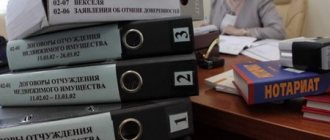People who are faced with receiving bequeathed property for the first time do not know which notary to contact to register an inheritance. The procedure for entering into an inheritance requires preparation and visiting various institutions where they collect the required list of certificates, confirmation of authority and other steps. Not all citizens have legal knowledge sufficient to properly register and conduct a case. Therefore, turning to a notary for help becomes a rational action for those who want to avoid problems with inherited property.
How to identify a notary for inheritance
After a short time from the date of the death of the testator or the opening of the will, relatives will need to contact a legal specialist in order to assume inheritance powers or register the right of inheritance. Sometimes the successors do not know how long after death they can take ownership of the property, what the legal obligations are, and they often miss the time allocated for this.
Six months must not have passed since the death of the owner of the will. If the deadlines are missed, you will have to contact the judicial authorities to rehabilitate yourself, and the registration of the inheritance will drag on indefinitely.
The competence of a lawyer dealing with succession issues includes:
- checking the authenticity of papers and stated facts (death, missing the right moment of inheritance, etc.);
- determination of the composition and assessment of bequeathed property;
- searching for a will;
- determination of relationship with the deceased;
- determination of co-heirs;
- certification of the successor’s powers and many other processes.
Finding a notary whose office is geographically assigned to the place of registration of the deceased is easy. This can be done through the online portal of the notary chamber or by contacting any lawyer.
By last name of the deceased person
You need to know which notary to contact when entering into an inheritance. On the one hand, the paperwork opens in the entity where the testator was registered at the time of death. In this case, the successor undertakes to collect and hand over the necessary papers to the lawyer, and in addition to this, contact another notary who was involved in drawing up and certifying the will.
A special system has been developed on the website of the notary chamber that helps to search for inheritance cases. For a positive outcome, the applicant must enter the following data:
- Full name of the testator (the field must contain the full name without errors, otherwise the case will not be found);
- dates of birth and death of the testator (and unknown data will not interfere with the search).
Any lawyer can provide assistance in finding a specialist who deals with the affairs of a deceased relative. The applicant should obtain information from the nearest law firm. Using the database, a specialist will be found whose jurisdiction the testator’s name falls under.
At the place of residence
All legal professionals are assigned and registered in notary chambers. By contacting this authority, the successor will quickly receive information about the legal entity involved in the procedure for registering the will of the deceased relative. The application indicates the surname, name and patronymic of the deceased and the address of his posthumous registration.
At the place of opening of the inheritance
It is possible to determine where the inheritance case was opened by the registration of the testator. According to the Civil Code of the Russian Federation, the opening of an inheritance is carried out in the subject of the country in which the testator was registered or resided at the time of death.
However, the actual address may differ from the official registration, therefore the law requires opening an inheritance at the registered place of residence. In the absence of registration and the impossibility of establishing it, the paperwork starts in the region where the willed property or its main share is located.
In the case of an inheritance consisting of real estate and movable property located in different places, the inheritance procedure is initiated in the region where the most valuable object is located.
Is it possible to refuse and choose a better specialist?
If an inheritance case has already been opened, it is impossible to refuse a notary without significant grounds. If you don’t like a specialist or seem to be insufficiently competent, then it will not be easy to refuse him.
When such a decision is associated with real problems and mistakes on the part of a specialist, you should complain about it to the city notary chamber.
Expert opinion
Irina Vasilyeva
Civil law expert
If it is determined that the notary does not fulfill his duties in good faith, then a replacement is possible. Otherwise, you cannot change the specialist.
Documents for contacting a notary when registering an inheritance
The procedure for registering an inheritance takes place in accordance with legislative acts on the distribution of shares or based on the orders left in the will. A document drawn up by the copyright holder with a complete list of inherited property will require the applicant to provide a passport. Acceptance of ownership after entering into legal title will occur automatically; you only need to write a corresponding application.
The list of additional documents required for inheritance will be indicated by the notary in certain situations. The basic agreements required to formalize an inheritance include:
- statement of the successor's intention to assume office;
- certificate of the death of the testator or a court ruling on his death;
- identification document of the deceased;
- passport of a successor or several;
- certificate of registration of the last place of residence of the testator;
- when transferring an apartment or other real estate by inheritance, proof of the presence or absence of citizens registered in the living space is provided;
- documents on relationship with the deceased;
- involvement of a third party to whom the rights and obligations to conduct the business are transferred (will require the conclusion of a trust agreement).
The notary is provided with the originals of all papers, on the basis of which the successor receives a certificate of inheritance.
What documents are needed
The necessary documents for registering an inheritance with a notary depend mainly on the type of property received. However, there are also general requirements in relation to the information submitted to the notary.
In any case, the notary must submit:
- Application for inheritance.
- A copy of the death certificate of the testator.
- Identity document of the heir(s).
If we are talking about inheritance by law, all available evidence of family ties between the testator and applicants for his property is provided.
This includes birth or marriage certificates. When kinship has been established in court, an appropriate decision will be required.
Care should be taken to evaluate the property being inherited. Based on the value determined by the appraiser, the state duty for issuing a certificate of inheritance will be determined. Now let's move on to the composition of documents in the context of specific types of property.
Real estate: apartment, house, land
First of all, you will need all the documents for the relevant object. They mean a certificate of registration of property, an extract from the register of rights, and a privatization agreement.
In addition, the notary will need:
- Technical and cadastral passports.
- Layout of the land plot.
- Evidence of the allocation of a part in real estate (if a share is inherited).
- Information from the house register.
- An extract from Rosreestr confirming that the apartment (house, land) is not burdened with encumbrances.
Depending on the region, the notary may ask the heirs to provide additional information and certificates.
Vehicles: car, motorcycle, trailer
The object of inheritance can only be those cars or motorcycles that belonged to the testator by right of ownership. If a person owned a vehicle on the basis of a power of attorney or a lease agreement, then such property is not inherited.
So, what do heirs need to re-register rights to vehicles?
List of documents:
- Certificate of registration of the vehicle (motorcycle, trailer).
- Passport for the vehicle (PTS, registration certificate).
- An expert's report on the value of the inheritance object at the current time.
Actually, nothing else is required for a notary. Therefore, there should be no problems with taking over your rights.
Bank deposits
Not only valuables and real estate are inherited, but also the funds that the deceased had during his lifetime.
When it comes to a bank deposit, the notary will need:
- Deposit account agreement and savings book (if available).
- A certificate from the bank about the balance of the deposit (it can be obtained based on a personal request from a notary).
Part of the money can be received from a bank deposit before the completion of the inheritance to compensate for the costs of the funeral of a deceased relative. In this case, the notary will prepare a corresponding decree for presentation to the bank.
Share in business: LLC, shares
When the testator was involved in entrepreneurship during his lifetime, his corporate rights also go to the heirs.
To receive them, the notary must provide:
- Extract from the Unified Register of Legal Entities.
- A copy of the company's charter.
- A certificate confirming full payment of shares or share in the authorized capital.
- Information from the register of shareholders.
- Valuation based on the current value of shares or part of the authorized capital.
The notary has the right to ask for additional information depending on the specifics of the activities of the company in which the share is inherited.
Prices for notary services
Notaries charge a certain fee for their services within the limits of the law. Contacting specialists entails material costs, which are regulated by state regulations.
The payment amount includes not only the preparation and certification of documents, but also the technical and legal aspects accompanying the paperwork.
The cost of a notary's work when registering an inheritance consists of the following points:
- registration of a will – from 1900 rubles;
- cancellation of the previous version of the will – 500 rubles;
- certification of will – from 100 rubles;
- certification of the successor’s assumption of authority certificate – from 100 rubles;
- issuance of a certificate of inheritance – from 100 rubles.
In addition, when entering into inheritance, the applicant pays a state duty in the amount of 0.3 or 0.6% of the assessed value of the property. The higher the value of the inherited property, the greater the amount that will have to be transferred.
You can first consult with a specialist as part of free legal assistance on any of the Internet sites or look for an office that provides free advice in your city.
Entry procedure
To take ownership of the deceased’s estate, you must express your will to acquire the obligations and property rights of the testator. This procedure is carried out by a notary at the registration address to formalize the inheritance.
Entry into inheritance is carried out as follows:
- The heir declares his intention to accept the fortune.
- The applicant presents the documents necessary to obtain a certificate of inheritance.
- Specialist services are paid.
- 6 months after the death of the testator, the transfer of ownership rights is formalized.
Please note that ownership of real estate is acquired by the heir at the time of opening of the inheritance. However, it can only be disposed of after all documents have been completed.
Details of the process of entering into property rights are in the article “How to enter into inheritance rights.”
Distribution of notaries for inheritance cases
The duties of a notary include a wide range of legal transactions. Legal experts are not authorized by law to carry out certain regulatory actions. This means that, if necessary, the notary has the opportunity to engage in different types of activities. When choosing which notary to contact regarding acceptance of an inheritance, the successor must take into account important conditions, including the following:
- The registration of the testator's place of residence must be consistent with the lawyer's place of residence.
- The distribution of notaries for inheritance cases occurs according to alphabetical order. Each specialist is allocated a certain period of letters, and the choice of which notary you can register an inheritance with is based on the surname of the deceased relative.
- In the absence of information about the registration of the testator, the property is registered in a company located in the subject where the property or a significant part of it is located.
The successor may be faced with the problem of how to choose a notary to formalize the inheritance if a written will has been drawn up. The specificity of the document is that it is drawn up in two copies, one of which is provided to the heir, and the second remains in the folders of the legal specialist.
According to the standards of the Civil Code of the Russian Federation, an inheritance can be signed off from any notary. In the future, when searching for a document, if its location is unknown, you can contact any notary, who, in turn, will find the address of the required office using the general database.
When deciding which notary to register the inheritance with, the successor should be guided by its territorial distribution.
How are inheritance matters distributed?
The work of the notary in Russia is organized according to the territorial principle (Article 13, Law N 4462-1 “Fundamentals of the legislation of the Russian Federation on notaries”). This means that an inheritance case can be opened by any notary working in the district where the inheritance was discovered.
In addition, many notarial districts provide for an additional alphabetical distribution of inheritance cases. At the same time, several letters are assigned to each notary (with which the surnames of deceased citizens begin).
There are several ways to find the right specialist:
- check with any notary office;
- contact the regional notary chamber;
- use the electronic register of open inheritance cases.
For one open inheritance, only one case is opened. Therefore, the law places special requirements on the procedure for establishing the place where the right of inheritance arose.
Can I contact any notary?
In contrast to the system that distributes notaries according to districts and according to the alphabetical principle, a project called “Inheritance Without Borders” (NBG) began its activities in the Russian Federation.
The essence of the idea is that successors can use the services of the selected specialist, regardless of territorial and alphabetical distribution. However, this rule applies to cases in which the death of the testator occurred after the entry into force of the new rules. For applicants whose relatives died before the introduction of the NBG, it is expected to contact legal experts according to the old principle.
The program was first tested on August 1, 2005. Thus, inheritance cases opened after this date fall under its scope. Heirs have expanded rights and independently determine how to choose a notary to register an inheritance in any area of their locality.
The sphere of influence of the NBG extends to Moscow and its region (since 2014), St. Petersburg and regional entities (since 2014). In addition, residents of the Chelyabinsk (2014), Novosibirsk (2015) and Irkutsk (2016) regions, Altai (2014) and Perm (2015) territories have such powers. In these constituent entities of the Russian Federation, citizens have the opportunity to choose a notary in any district, regardless of its territorial distribution.
Inheritance queue
Currently in Russia there are eight lines of heirs by law:
- The first priority is the spouse, parents and children (as well as grandchildren and their descendants by right of representation);
- The second priority is siblings (including half-siblings), grandparents (as well as nephews and nieces by right of representation);
- Third priority - uncles and aunts (as well as cousins by right of representation);
- The fourth stage is great-grandfathers and great-grandmothers;
- Fifth line - children of nephews and nieces, brothers and sisters of grandparents;
- Sixth line - grandchildren of nephews and nieces, children of cousins, cousins (children of grandparents' siblings);
- The seventh line is stepsons, stepdaughters, stepfather and stepmother.
- Eighth stage - disabled dependents of the testator inherit independently as heirs of the eighth stage. (clause 3 of article 1148 of the Civil Code of the Russian Federation)
If your rights as an heir are infringed upon by other persons, you have the right to use the services of a lawyer.
Moscow Bar Association
Address : 119002, Moscow, lane. Sivtsev Vrazhek, 43 Phone Website : https://www.advokatymoscow.ru/ Number of lawyers : 11091
Go to choosing a lawyer
Procedure for entering into an inheritance when contacting a notary
In order to enter into an inheritance according to all the rules and avoid possible problems with other successors in the future, it is better for the heir to carry out this procedure according to the law, through a notary. The following actions should be taken:
- Obtain a certificate of death or death of the testator.
- Submit an application to the notary to accept the inheritance.
- Check for a will.
- Collect a package of documents for re-registration of property.
- Appraise the property.
- Provide the collected papers to the notary.
- Pay the state fee.
- Acceptance of the inheritance is evidenced by receipt of a document from a notary.
Registration of the property of the deceased, if the deadlines established by law are missed, will require going to court and providing valid evidence of delay in this matter.
How and where to get a free consultation
There are many ways to get advice from a lawyer. And the procedure for receiving an inheritance is no exception in this regard.
Along with paid consultations, free communication with a lawyer is available. If you don’t have time to go to a personal appointment with a specialist, then the website yurist-spb24.ru will come to the rescue.
On our resource, you can get legal advice in two forms: by phone and online (by communicating with a specialist in the comments below the article).
In this way, it is easy to get advice on the procedure for choosing a notary, the composition of the required documents, and the timing of contacting a notary.
Please note that online consultation is available 24 hours a day, any day of the week. By asking a question in the comments to the article, you will definitely receive an answer.
The lawyer will also tell you what actions should be taken after completing the inheritance procedure.
However, answers to some pressing user questions can be found directly on our website. After all, many people who want to inherit an inheritance have similar difficulties.
Is it possible to choose a notary yourself?
As a general rule, you cannot independently choose a specialist to formalize inheritance law. Heirs living in other regions must contact the notary office at the place of registration of the deceased owner.
To facilitate the registration procedure, the “Inheritance Without Borders” program has been developed. The system is based on a unified register into which information about notarial acts performed is entered.
As part of the program, an application to open an inheritance case is submitted to any notary office. The specialist checks the availability of a record of the establishment of a case by another notary through an electronic database. This operation allows you to eliminate duplication of the inheritance case.
Advantages of using the service:
- free choice of specialist;
- exclusion of re-institution of the case;
- reducing the time it takes to receive information from other regions;
- saving time for assignees.
Among the shortcomings of the “Inheritance Without Borders” program, the priority of the first appeal is noted. If there are several heirs, only the applicant who submits the application first can choose a notary.
In some regions, the program does not apply to the acceptance of inheritance by law (in the absence of a will).







